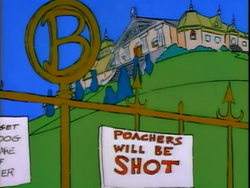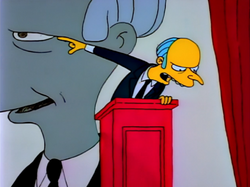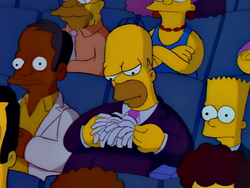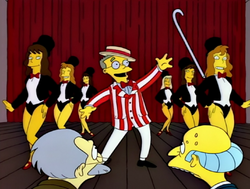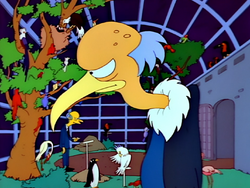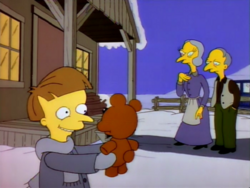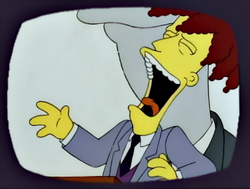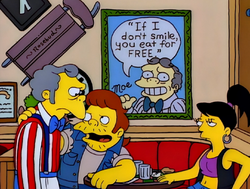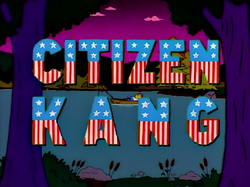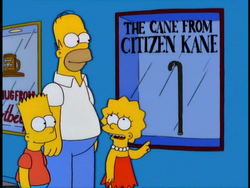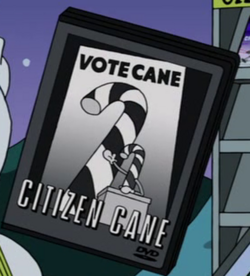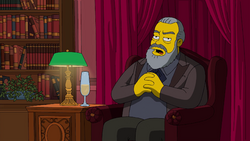
Difference between revisions of "Citizen Kane"
Wikisimpsons - The Simpsons Wiki
(Added more info) |
Simpsons88 (talk | contribs) m |
||
| Line 1: | Line 1: | ||
{{Realworld}} | {{Realworld}} | ||
{{Italic title}} | {{Italic title}} | ||
| − | |||
'''''Citizen Kane''''' is a 1941 film, directed by and starring [[Orson Welles]]. It was his debut movie and featured a lot of cinematic innovations, alongside a powerful story about the rise and fall of a newspaper tycoon, Charles Foster Kane. The film became a classic and is often called "the greatest film of all time" by film critics and therefore frequently referenced on ''The Simpsons''. So much, in fact, that one of the writers claimed that it may be, alongside ''[[The Godfather]]'', the most parodied film on the show. | '''''Citizen Kane''''' is a 1941 film, directed by and starring [[Orson Welles]]. It was his debut movie and featured a lot of cinematic innovations, alongside a powerful story about the rise and fall of a newspaper tycoon, Charles Foster Kane. The film became a classic and is often called "the greatest film of all time" by film critics and therefore frequently referenced on ''The Simpsons''. So much, in fact, that one of the writers claimed that it may be, alongside ''[[The Godfather]]'', the most parodied film on the show. | ||
| Line 18: | Line 17: | ||
{{TB|"[[There's No Disgrace Like Home]]"}} | {{TB|"[[There's No Disgrace Like Home]]"}} | ||
{{TB| [[Burns' Manor]] first appears, which is modelled after Kane's manor, particularly the gate with the first letter of the owner's name inside a circle.}} | {{TB| [[Burns' Manor]] first appears, which is modelled after Kane's manor, particularly the gate with the first letter of the owner's name inside a circle.}} | ||
| − | {{TBT|}} | + | {{TBT|[[File:Burns election campaign.png|250px]]}} |
{{TB|[[Season 2|2]]}} | {{TB|[[Season 2|2]]}} | ||
{{TB|017}} | {{TB|017}} | ||
{{TB|"[[Two Cars in Every Garage and Three Eyes on Every Fish]]"}} | {{TB|"[[Two Cars in Every Garage and Three Eyes on Every Fish]]"}} | ||
{{TB|The scene where Mr. Burns is trying to be elected as governor in front of a large black and white poster of his own face references a similar scene in the movie where Kane is trying to be elected president. Later, when Burns' election campaign begins to plummit he shouts, "You can't do this to me. I'm Charles Montgomery Burns!" This is a parody of the line that Kane speaks when he fails in getting elected, "You can't do this to me. I'm Charles Foster Kane."}} | {{TB|The scene where Mr. Burns is trying to be elected as governor in front of a large black and white poster of his own face references a similar scene in the movie where Kane is trying to be elected president. Later, when Burns' election campaign begins to plummit he shouts, "You can't do this to me. I'm Charles Montgomery Burns!" This is a parody of the line that Kane speaks when he fails in getting elected, "You can't do this to me. I'm Charles Foster Kane."}} | ||
| − | {{TBT|}} | + | {{TBT|[[File:Homer playing with paper.png|250px]]}} |
{{TRs|[[Season 4|4]]|3}} | {{TRs|[[Season 4|4]]|3}} | ||
{{TB|061}} | {{TB|061}} | ||
{{TB|"[[A Streetcar Named Marge]]"}} | {{TB|"[[A Streetcar Named Marge]]"}} | ||
{{TB|When Homer watches the musical rendition of "[[A Streetcar Named Desire]]" he becomes uninterested and begins amusing himself by playing with a piece of paper, similar to the way a bored Joseph Cotten does in the theater audience while watching the opera in which Kane's mistress performs.}} | {{TB|When Homer watches the musical rendition of "[[A Streetcar Named Desire]]" he becomes uninterested and begins amusing himself by playing with a piece of paper, similar to the way a bored Joseph Cotten does in the theater audience while watching the opera in which Kane's mistress performs.}} | ||
| − | {{TBT|}} | + | {{TBT|[[File:Smithers' dance act for Mr. Burns.png|250px]]}} |
{{TB|066}} | {{TB|066}} | ||
{{TB|"[[Marge Gets a Job]]"}} | {{TB|"[[Marge Gets a Job]]"}} | ||
{{TB|[[Smithers]]' dance act for Mr. Burns, ''[[Tribute to Mr. Burns]]'', is a direct parody of a dance act organized for Charles Foster Kane.}} | {{TB|[[Smithers]]' dance act for Mr. Burns, ''[[Tribute to Mr. Burns]]'', is a direct parody of a dance act organized for Charles Foster Kane.}} | ||
| − | {{TBT|}} | + | {{TBT|[[File:Mr. Burns's vulture.png|250px]]}} |
{{TB|076}} | {{TB|076}} | ||
{{TB|"[[Last Exit to Springfield]]"}} | {{TB|"[[Last Exit to Springfield]]"}} | ||
| Line 46: | Line 45: | ||
{{TB|"[[Sideshow Bob Roberts]]"}} | {{TB|"[[Sideshow Bob Roberts]]"}} | ||
{{TB|When [[Sideshow Bob]] is elected major of Springfield the black-and-white poster seen behind him is similar to the one seen behind Kane.}} | {{TB|When [[Sideshow Bob]] is elected major of Springfield the black-and-white poster seen behind him is similar to the one seen behind Kane.}} | ||
| − | {{TBT|}} | + | {{TBT|[[File:Sled with the name Rosebud.png|250px]]}} |
{{TB|[[Season 7|7]]}} | {{TB|[[Season 7|7]]}} | ||
{{TB|132}} | {{TB|132}} | ||
Revision as of 14:51, July 25, 2020
Citizen Kane is a 1941 film, directed by and starring Orson Welles. It was his debut movie and featured a lot of cinematic innovations, alongside a powerful story about the rise and fall of a newspaper tycoon, Charles Foster Kane. The film became a classic and is often called "the greatest film of all time" by film critics and therefore frequently referenced on The Simpsons. So much, in fact, that one of the writers claimed that it may be, alongside The Godfather, the most parodied film on the show.
References to Citizen Kane in The Simpsons
Episodes
|
Comics
|
External links

